The odds against Judd and Jackson’s survival were astronomical — but today, these Southern California Shelter residents are not only surviving, but thriving.
These handsome boys started their lives in a commercial hatchery charged with hatching female chickens who would be used for egg production at a commercial egg-laying facility. Judd and Jackson are likely Miller’s Champion Brown Leghorns — a type of chicken specifically genetically bred for maximum egg production.
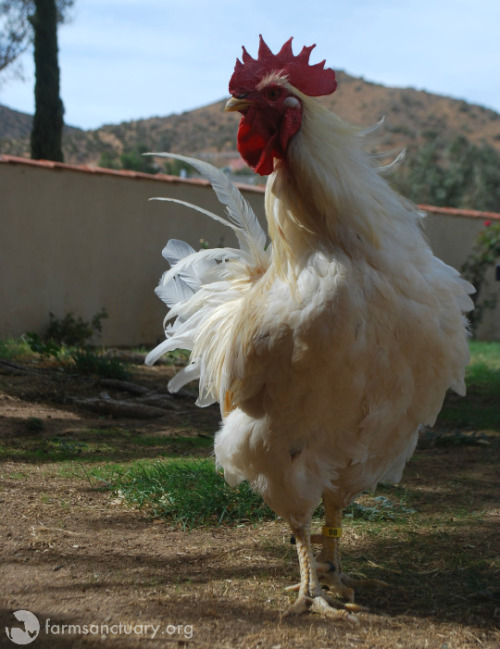
Jackson
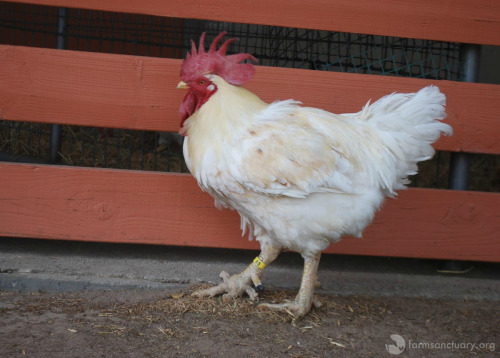
Judd
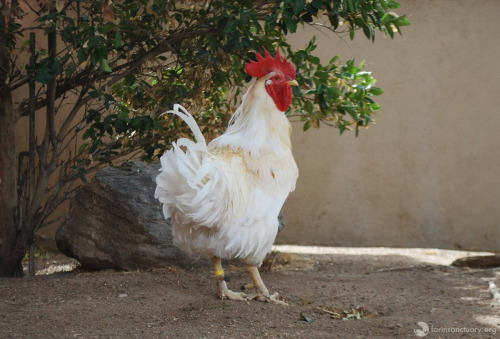
Jackson
As boy chicks at a commercial hatchery, Judd and Jackson would ordinarily have suffered the typical fate of their male cohort — death in an unimaginably awful way, either by being ground alive in a macerator, suffocated along with thousands of other chicks in a giant trash bag, suffocated by carbon monoxide, electrocuted, or having their necks broken. All of these methods of culling day-old male chicks are legal standard operating practice in the egg laying industry. Since males do not lay eggs, they are considered to be of no value to the industry and are killed because of that economic “worthlessness.”
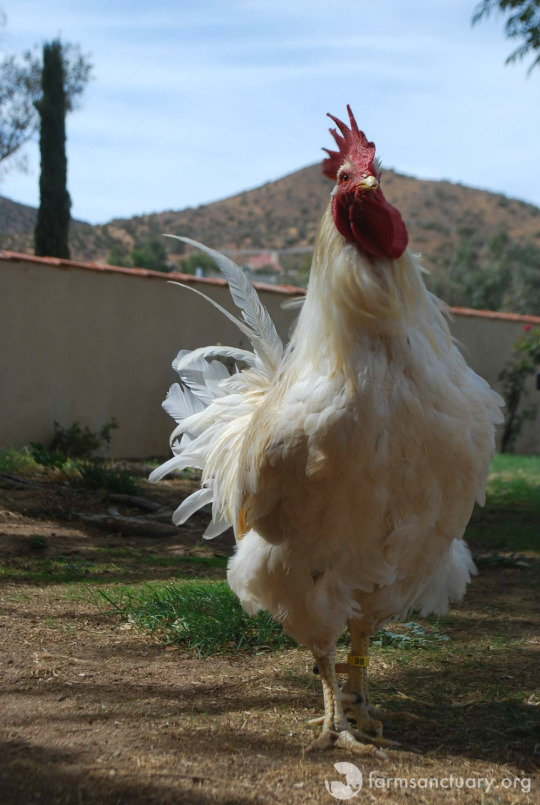
“Who, me? Worthless?!? Pshaw.”
—Jackson
Though Judd and Jackson were males born into the egg-laying
industry, they avoided the fate of being brutally killed on their first day of life through a stroke of luck: They
were improperly sexed. Sexing chicks is not
a science, so occasionally a stray male chick makes it through the culling
process. What makes Judd and Jackson’s
tale so unusual is that the male and female chicks of their breed are differently colored,
which generally leaves no margin for sexing error. Yet Judd and Jackson were not culled. (The only plausible conclusion is that they were
shrouded in a cloak of invisibility at the time. Nothing else makes sense.)
Once through the gantlet of male chick death, these two boys
were treated as if they were females entering the egg-laying industry (since they were believed to be) and debeaked (another standard industry practice) to prepare them for a shortened
life spent in intense confinement in a battery cage. While their bodies were being mutilated, no
one noticed that these boys were, in fact, boys.
Mutilation complete, they continued to be treated as soon-to-be
hens.
Eventually, though, somewhere in the process, the biological truth was discovered: Judd and Jackson would never lay eggs. They were discarded by the egg industry, but they weren’t immediately killed. Instead, remarkably, the next leg of their journey found them shoved into crates along with thousands of “spent” hens — hens considered valueless by the industry because their most productive
egg-laying days are behind them (typically at approximately 18 months to two years
of age) — headed to be slaughtered as part of a kapporot ceremony.
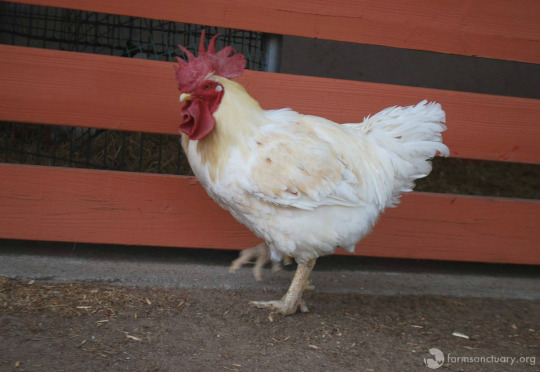
Judd exploring his sanctuary home.
In the custom of kapparot, a rite practiced by some members of the Jewish community that is observed in conjunction with Yom Kippur, a participant holds a chicken by
the wings or the legs and circles the bird above his or her head as these words are spoken: “This is my exchange, my substitute, my atonement; this rooster (or hen) shall go to its death, but I shall go to a good, long life, and to peace.” A butcher then kills the bird with a slash to the throat.
This ritual is meant to symbolically transfer the sins of the participant to
the chicken and extinguish the guilt of the sins upon the bird’s death.
Despite the decline in the practice and the wide acceptance
of the bloodless alternative of performing the kapparot ritual with a bag of
coins that are then donated to charity, thousands of chickens are still trucked
into some urban areas — often from factory farms — and slaughtered in
makeshift butchers’ stations on sidewalks or in parking lots. Animal advocates
and many faith leaders consider the practice to be inhumane. In fact, former Israeli Chief Rabbi Shlomo
Goren has said: “… Repentance and charity can be better accomplished by using
money instead of a slaughtered chicken.” (Learn more about kapporot ceremonies, and the objections that many faith leaders have raised in response to them, at JewishVeg.org.)
Two years ago, amidst demonstrations by animal activists, nearly
50 birds were spared from the practice. Judd and Jackson were among them — not because
they were roosters (that fact had yet to be discovered), but simply due to the luck of the draw. Possibly minutes or hours before their death would have arrived,
Judd and Jackson were randomly chosen to be spared along with the hens who were
given to activists. On that
fateful night, everything changed for these two majestic boys. Arrangements were made for their future: They would come to Farm Sanctuary to live out their lives in peace.
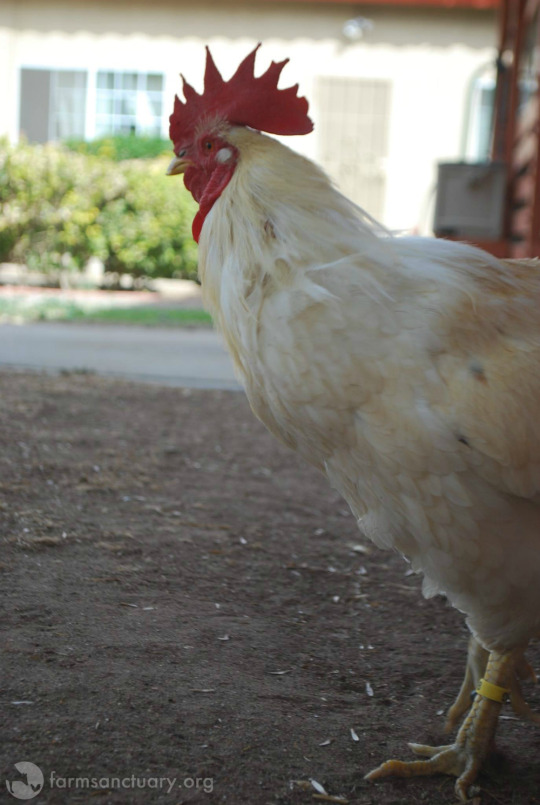
Jackson hanging out in the courtyard.
Once they arrived at our Southern California Shelter, along with the hens
who’d also been spared, we instantly knew that there was something different about Judd and Jackson. They were youngsters, but though
they were still peeping and not yet crowing, we knew they were young roosters
who had avoided death many times over.
Jackson crowing and strutting.
Now safe and sound at Farm Sanctuary, these boys are able to be boys
—
and
proud and loud boys they both are. Judd,
who is the smaller and stouter of the pair, is fond of screaming to the gods at all hours of
the day, sleeping on his food bowl after he’s devoured his meal, bathing in the
dirt, and sometimes snuggling up to his big brother (observing such occurrences
is a rare treat for caregivers!). Jackson,
Judd’s longer, leaner counterpart, is the more dominant of the two, so he eats first
and chooses his napping and sleeping spots first. But he is a benevolent alpha rooster and
coexists mostly peacefully with Judd. As
many young roosters are, the boys are rambunctious and can sometimes put a fright into caregivers and cleaning staff members, but they are harmless and well-loved. When not posturing to protect their territory
and given the time, they calm down and act serene. They are true gentlemen — gentlemen who have
survived many trials; gentlemen whose lives were once considered to be useless; gentlemen who beat the odds over and over again.
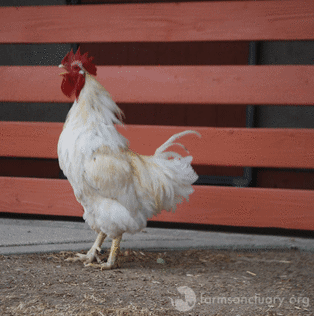
Jackson enjoying a good crow.
Enviroshop is maintained by dedicated NetSys Interactive Inc. owners & employees who generously contribute their time to maintenance & editing, web design, custom programming, & website hosting for Enviroshop.
